Related Research Articles
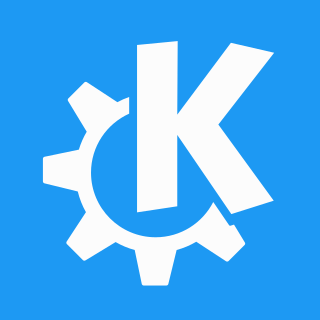
KDE is an international free software community that develops free and open-source software. As a central development hub, it provides tools and resources that allow collaborative work on this kind of software. Well-known products include the Plasma Desktop, KDE Frameworks, and a range of cross-platform applications such as Amarok, digiKam, and Krita that are designed to run on Unix and Unix-like operating systems, Microsoft Windows, and Android.
In computing, a desktop environment (DE) is an implementation of the desktop metaphor made of a bundle of programs running on top of a computer operating system that share a common graphical user interface (GUI), sometimes described as a graphical shell. The desktop environment was seen mostly on personal computers until the rise of mobile computing. Desktop GUIs help the user to easily access and edit files, while they usually do not provide access to all of the features found in the underlying operating system. Instead, the traditional command-line interface (CLI) is still used when full control over the operating system is required.

Gambas is the name of an object-oriented dialect of the BASIC programming language, as well as the integrated development environment that accompanies it. Designed to run on Linux and other Unix-like computer operating systems, its name is a recursive acronym for Gambas Almost Means Basic. Gambas is also the word for prawns in the Spanish, French, and Portuguese languages, from which the project's logos are derived.
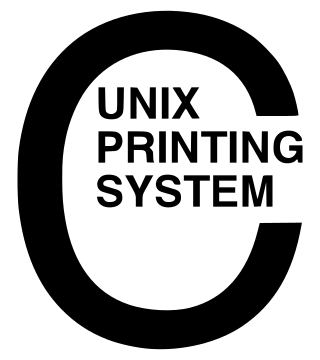
CUPS is a modular printing system for Unix-like computer operating systems which allows a computer to act as a print server. A computer running CUPS is a host that can accept print jobs from client computers, process them, and send them to the appropriate printer.
Eazel was an American software company operating from 1999 to 2001 in Palo Alto and then Mountain View, California. The company's flagship product is the Nautilus file manager for the GNOME desktop environment on Linux, which was immediately adopted and maintained by the free software movement. As the core of Eazel's business model, it is an early example of cloud storage services in the form of personal file storage, transparently and portably stored on the Internet. Renamed to Files, this application continues to be a centerpiece of some free Linux-based desktop environments.
Kolab is a free and open source groupware suite. It consists of the Kolab server and a wide variety of Kolab clients, including KDE PIM-Suite Kontact, Roundcube web frontend, Mozilla Thunderbird and Mozilla Lightning with SyncKolab extension and Microsoft Outlook with proprietary Kolab-Connector PlugIns.
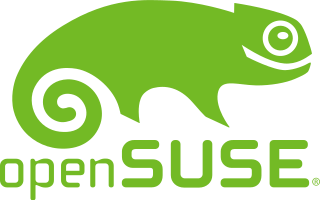
openSUSE is a free and open-source Linux distribution developed by the openSUSE project. It is offered in two main variations: Tumbleweed, an upstream rolling release distribution, and Leap, a stable release distribution which is sourced from SUSE Linux Enterprise.
Nuvola is a free software icon set under the GNU LGPL 2.1 license, created by David Vignoni. Originally created for desktop environments like KDE and GNOME, it is also available in packages for Windows and Mac. The final version, 1.0, contains almost 600 icons. The default set is in the PNG graphics format; an SVG version is also available.
The Tango Desktop Project was an open-source initiative to create a set of design guidelines and to provide a consistent user experience for applications on desktop environments. The project created a set of icons known as the Tango Icon Library and that were described as a "proof of concept". The Tango Desktop Project was a project of freedesktop.org, and was closely linked with other freedesktop.org guidelines, such as the Standard Icon Theming Specification.
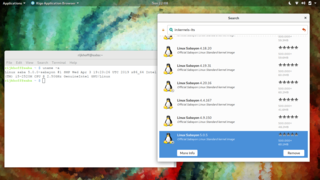
Sabayon Linux or Sabayon, was an Italian Gentoo-based Linux distribution created by Fabio Erculiani and the Sabayon development team. Sabayon followed the "out of the box" philosophy, aiming to give the user a wide number of applications ready to use and a self-configured operating system.

KDE Plasma 4 is the fourth generation of the KDE workspace environments. It consisted of three workspaces, each targeting a certain platform: Plasma Desktop for traditional desktop PCs and notebooks, Plasma Netbook for netbooks, and Plasma Active for tablet PCs and similar devices.
In computing, a keyboard shortcut is a sequence or combination of keystrokes on a computer keyboard which invokes commands in software.
A desktop environment is a collection of software designed to give functionality and a certain look and feel to an operating system.

In the 1950s and 1960s, computer operating software and compilers were delivered as a part of hardware purchases without separate fees. At the time, source code, the human-readable form of software, was generally distributed with the software providing the ability to fix bugs or add new functions. Universities were early adopters of computing technology. Many of the modifications developed by universities were openly shared, in keeping with the academic principles of sharing knowledge, and organizations sprung up to facilitate sharing. As large-scale operating systems matured, fewer organizations allowed modifications to the operating software, and eventually such operating systems were closed to modification. However, utilities and other added-function applications are still shared and new organizations have been formed to promote the sharing of software.
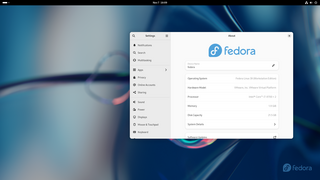
Fedora Linux is a Linux distribution developed by the Fedora Project. It was originally developed in 2003 as a continuation of the Red Hat Linux project. It contains software distributed under various free and open-source licenses and aims to be on the leading edge of open-source technologies. It is now the upstream source for CentOS Stream and Red Hat Enterprise Linux.
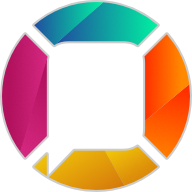
Opendesktop.org is a website portal offering personal cloud services such as storage and communication services, as well as public services in form of a store for libre content publishing and a code hosting site for open development.
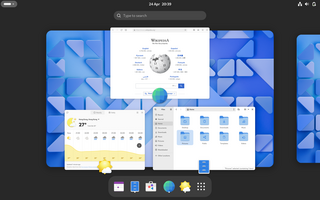
GNOME, originally an acronym for GNU Network Object Model Environment, is a free and open-source desktop environment for Linux and other Unix-like operating systems.
Fedora Linux is a popular Linux distribution developed by the Fedora Project. Fedora attempts to maintain a six-month release schedule, offering new versions in May and November, although some releases have experienced minor delays.

MATE is a desktop environment composed of free and open-source software that runs on Linux, and other Unix-like operating systems such as BSD, and illumos operating systems.
References
- ↑ Zingarini, Stefano. "KXDocker". XIA Projects. Retrieved 28 March 2024.
- ↑ "xqde.xiaprojects.com is almost here!". xqde.xiaprojects.com. Retrieved 28 March 2024.
- ↑ "XQDE". SourceForge. Retrieved 28 March 2024.
- Aleksey 'LXj' Alekseyev (January 4, 2007) KXDocker: More than a task manager, linux.com
- (in German) Wolfgang Miedl (10 January 2005), Linux-Startleiste im Apple-Stil (Linux taskbar in Apple style), Computerwoche
- Marcel Gagné (January 5, 2005) Cooking with Linux - Eye-Popping Panels, Linux Journal
